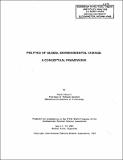| dc.contributor.author | Choucri, Nazli | |
| dc.date.accessioned | 2023-02-14T21:20:15Z | |
| dc.date.available | 2023-02-14T21:20:15Z | |
| dc.date.issued | 1991-07 | |
| dc.identifier.uri | https://hdl.handle.net/1721.1/148068 | |
| dc.description.abstract | "The emergence of climate change in the international political agenda is of recent origin. The possibility of environmental changes induced by human action is a relatively new factor in both the conduct and the study of international relations. It is now recognized that technological development, interacting with population trends and patterns of resource uses worldwide, has created problems of a global nature and globalized problems that had earlier been more local or regional in character. Not only do we live in an interdependent world but in an increasingly global one. This paper presents key conceptual and theoretical issues central to prospects for coordinated international responses and presents some empirical evidence. A major concern is depicting the characteristic requisites, conditions, and processes for managing the global environment as well as the principles for environmental management." | en_US |
| dc.language.iso | en_US | en_US |
| dc.publisher | International Political Science Association | en_US |
| dc.subject | international; environmental management; international relations | en_US |
| dc.title | Politics of Global Environmental Change: A Conceptual Framework | en_US |
| dc.type | Article | en_US |
| dc.identifier.citation | XVth World Congress of the International Political Science Association, 1991, Buenos Aires, Argentina | en_US |
